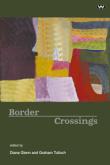Thus opens Gerald Murnane's novel The Plains. It begins with a border crossing of sorts. The narrator, who remains nameless throughout the novel, recounts the process of crossing from Australia into the plains. The reader obligingly follows. Yet, the narrator cannot be sure of exactly when and where, let alone if he crossed from Australia into the plains. The border is imperceptible. This imperceptibility is not merely a problem of borders, or even a problem of place. As Gillet notes, it is a problem of 'language' and 'knowledge' - a problem, perhaps, of interpretation. What I am alluding to here is acknowledged and even perpetuated by the narrator himself. In these opening few lines the narrator refers to interpretation twice, both times in reference to the land around him. The plains, he states, seem to be the source of hidden meanings. The person approaching the plains is willed to search for such meanings. Furthermore, the search for hidden meanings, the act of interpretation, is a private one. The plains, the narrator comments, 'seemed more and more a place that only I could interpret.' (Introduction)



